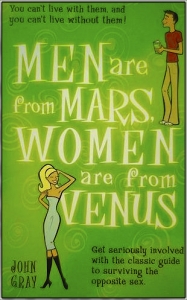 After the publication of John Gray’s best-selling book in 1992, Men are From Mars, Women are From Venus, the world got a new taste of the real differences between the sexes. While some have criticized the book for it’s overall stereotyping of genders, the 7 million plus copies sold tells us that perhaps there’s truth to Gray’s words. He discusses the way men and women differ when they deal with stress, their ability to give to other people, and the giving/receiving of love. But what about dating and causal sex? Where do men and women situate themselves when it comes to long-term and short-term dating? I had to dig deeper (and maybe find something that wasn’t almost two decades dated?).
After the publication of John Gray’s best-selling book in 1992, Men are From Mars, Women are From Venus, the world got a new taste of the real differences between the sexes. While some have criticized the book for it’s overall stereotyping of genders, the 7 million plus copies sold tells us that perhaps there’s truth to Gray’s words. He discusses the way men and women differ when they deal with stress, their ability to give to other people, and the giving/receiving of love. But what about dating and causal sex? Where do men and women situate themselves when it comes to long-term and short-term dating? I had to dig deeper (and maybe find something that wasn’t almost two decades dated?).
Well, I found myself ever further back in time when I came across a study conducted in 1989 by Clark and Hatfield. Looking at the contexts under which males and females might be short-term or long-term oriented, they uncovered sex differences in mating by asking a series of questions on a college campus. But, their main goal was to discover an answer to THIS question – are males more likely, overall, to be more interested in short-term mating than females?
They conducted their experiment by using “attractive” undergraduate college students at an American university – these students would approach other students of the opposite sex and ask them the following: “I’ve been noticing you around campus and find you very attractive, would you …”
Go on a date with me?
Women “yes” – 50%
Men “yes” – 50%
Come back to my apartment with me?
Women “yes” – 6%
Men “yes” – 69%
Come back to my apartment and have sex with me?
Women “yes” – 0%
Men “yes” – 75%
Their findings show that women were almost entirely unreceptive to a male stranger’s offers for casual sex. Now, you may be reading this completely unsurprised by Clark and Hatfield’s results that men are more interested in casual sex than women. But it’s important to note that most of these subjects were between the ages of 18 to 22, an age range that we commonly associate with the onset of sexual experimentation and curiosity (Kinsey showed us, however, that a woman’s sexual peak occurs somewhere around her early 30’s, not early 20’s). But, I think it shows us something else: young American male university students tend to be far more reckless than young women. On behalf of Juliland, I urge you all to be careful, and like my mother always says, bring pepper spray!
Yours truly,
Scarlett Stone













That study proves nothing except that social stigmas that our culture have put in place, make women feel ashamed for answering yes to that question, even if they wanted to.
Or it could be that women have enough common sense to know not to go to some random guys place that asks them on a college campus to go back to their dorm room? Sounds a little rapey to me. I don’t see the appeal there!